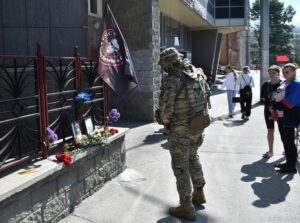Putin Indirectly Confirms the Death of Mercenary Leader Prigozhin
Russian President Vladimir Putin has indirectly confirmed the death of mercenary leader Yevgeny Prigozhin in a plane crash north of Moscow. In a televised address on Thursday, Putin expressed his condolences to Prigozhin’s family and praised him as a talented businessman. Regarding the cause of the crash, Putin stated that the investigations needed to be awaited, which would take time. This was the first time Putin commented on the crash.
Ukraine has denied any involvement. Putin and Prigozhin had openly quarreled following Prigozhin’s uprising in June. Meanwhile, Russian authorities have launched their investigation. The Investigative Committee, responsible for serious crimes, announced on Thursday that it is investigating “violations of aviation safety regulations.” The committee reportedly sent an investigative team to the crash site. Influential Kremlin supporters suspect an assassination. According to insiders, the US believes the plane was shot down.
US President Joe Biden said, “I don’t know exactly what happened. (…) Not much happens in Russia without Putin’s involvement.” The EU declined to comment on the incident for the time being, stating that the reports on the plane crash were difficult to verify. “Hardly anything coming out of Russia these days is credible,” said a spokesperson for the European External Action Service on Thursday.
Austrian Foreign Minister Alexander Schallenberg (ÖVP) expressed “no surprise” at the alleged death of Prigozhin. “It is not surprising that this happened,” Schallenberg said on Wednesday evening. In the past, individuals who took actions or made statements that did not align with Putin’s interests had a “shortened lifespan.”
Putin ally and CEO of the state media company RT, Margarita Simonyan, seemed to suspect that the incident could be an assassination. Regarding the rumors on the internet suggesting that Prigozhin’s disappearance may have been “staged,” she said in online media, “But personally, I lean towards the more obvious version.”
The plane crashed in the early evening on Wednesday in the Tver region of Russia. According to the Ministry of Emergency Situations, none of the ten occupants survived. Russia’s aviation authority, Rosaviatsiya, confirmed that Prigozhin was on board the plane, traveling from Moscow to St. Petersburg. Little was initially known about the other passengers; according to Russian media, most were Wagner mercenaries. Among the suspected dead was Prigozhin’s right-hand man, Dmitry Utkin, according to Rosaviatsiya. Authorities stated that the plane, which crashed near the village of Kushchino, was a private jet of the Embraer Legacy type.
Several online channels linked to the Wagner Group shared alleged videos of the crash, but the authenticity could not be verified by the AFP news agency. The videos showed burning wreckage in a field or a plane falling from the sky.
Meanwhile, US insiders believe that the Prigozhin aircraft was shot down by an anti-aircraft missile. The missile is said to have been fired within Russia, according to Reuters, citing US sources. However, the Russian online media outlet Basa reported suspicions that an explosion led to the crash of the plane. Investigators are reportedly pursuing the theory that one or two bombs were on board the aircraft. The non-state magazine usually has good contacts in security circles.
People laid flowers, candles, and patches with the Wagner logo outside the Wagner headquarters in St. Petersburg. “It’s like losing a father,” said one man.
In Ukraine, where Wagner troops have long been fighting, there was joy over Prigozhin’s alleged death. “I am really glad that this person has died, if it is true,” said a government official in downtown Kiev. “Let’s hope so.”
Until a brief rebellion two months ago against the Russian military leadership, the Wagner Group played a significant role in Russia’s offensive in Ukraine. At the same time, Prigozhin’s conflict with the Russian military leadership became openly apparent.
On June 23rd, Wagner mercenaries occupied military facilities in southern Russia, then marched towards Moscow. The rebellion was directed against the Russian General Staff and Defense Minister Sergei Shoigu, whom Prigozhin accused of failure in the Ukraine conflict.
Although Prigozhin called off the uprising after just one day, the Wagner leader had questioned the authority of President Putin with the brief rebellion. Without mentioning him by name, Putin branded the Wagner chief a traitor. Until the uprising, Prigozhin had long been considered a close associate of Putin.
In the weeks following the Wagner rebellion, Prigozhin’s fate remained uncertain. Then, on the past Monday, he appeared in a video circulated by Wagner-affiliated groups, stating that he was in Africa. The Wagner Group is known to be active in several African countries.




























































